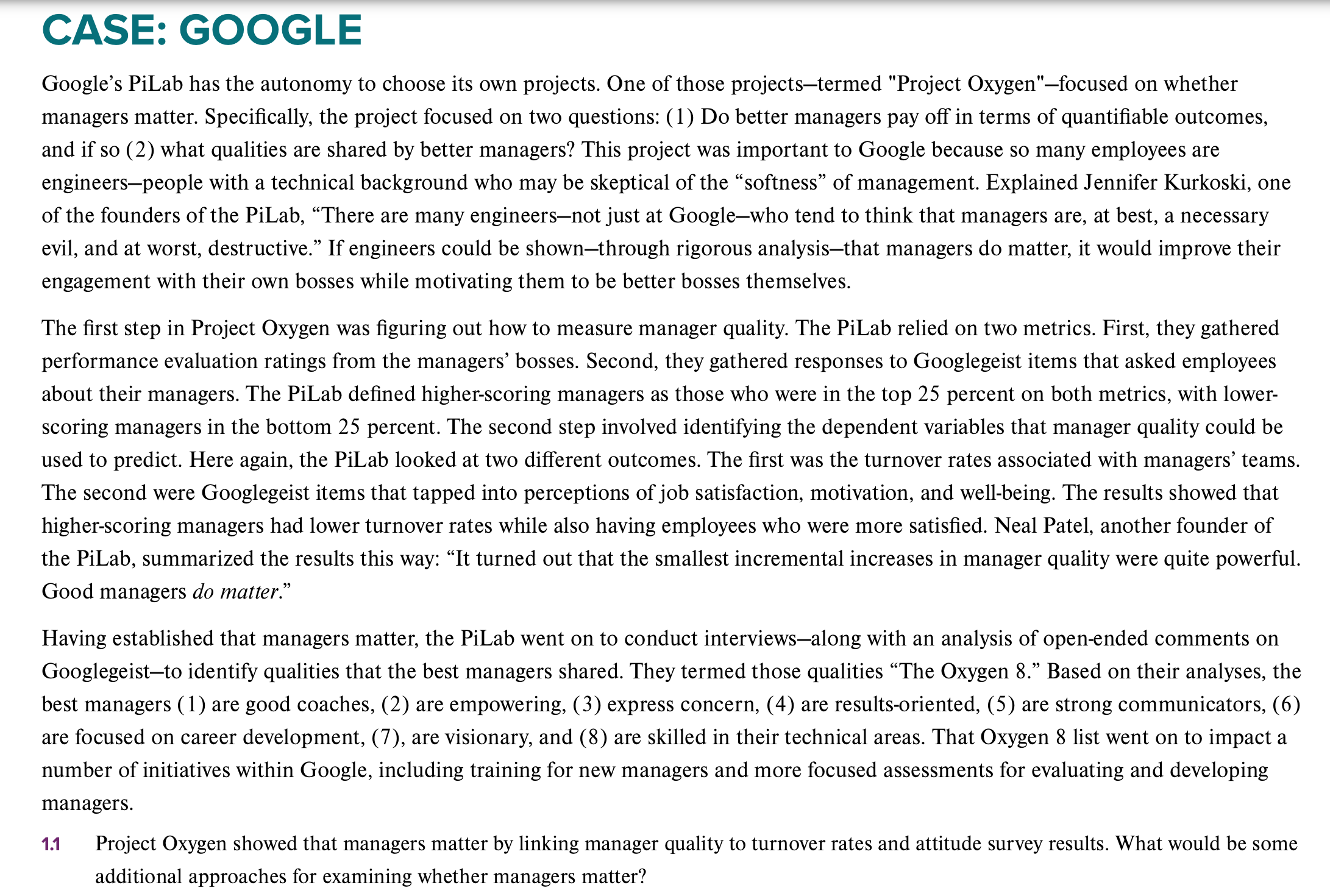Answered step by step
Verified Expert Solution
Question
1 Approved Answer
CASE: GOOGLE Google's PiLab has the autonomy to choose its own projects. One of those projects-termed Project Oxygen-focused on whether managers matter. Specifically, the

CASE: GOOGLE Google's PiLab has the autonomy to choose its own projects. One of those projects-termed "Project Oxygen"-focused on whether managers matter. Specifically, the project focused on two questions: (1) Do better managers pay off in terms of quantifiable outcomes, and if so (2) what qualities are shared by better managers? This project was important to Google because so many employees are engineers-people with a technical background who may be skeptical of the "softness" of management. Explained Jennifer Kurkoski, one of the founders of the PiLab, There are many engineers-not just at Google-who tend to think that managers are, at best, a necessary evil, and at worst, destructive." If engineers could be shown-through rigorous analysis-that managers do matter, it would improve their engagement with their own bosses while motivating them to be better bosses themselves. The first step in Project Oxygen was figuring out how to measure manager quality. The PiLab relied on two metrics. First, they gathered performance evaluation ratings from the managers' bosses. Second, they gathered responses to Googlegeist items that asked employees about their managers. The PiLab defined higher-scoring managers as those who were in the top 25 percent on both metrics, with lower- scoring managers in the bottom 25 percent. The second step involved identifying the dependent variables that manager quality could be used to predict. Here again, the PiLab looked at two different outcomes. The first was the turnover rates associated with managers' teams. The second were Googlegeist items that tapped into perceptions of job satisfaction, motivation, and well-being. The results showed that higher-scoring managers had lower turnover rates while also having employees who were more satisfied. Neal Patel, another founder of the PiLab, summarized the results this way: "It turned out that the smallest incremental increases in manager quality were quite powerful. Good managers do matter." Having established that managers matter, the PiLab went on to conduct interviews-along with an analysis of open-ended comments on Googlegeist-to identify qualities that the best managers shared. They termed those qualities "The Oxygen 8." Based on their analyses, the best managers (1) are good coaches, (2) are empowering, (3) express concern, (4) are results-oriented, (5) are strong communicators, (6) are focused on career development, (7), are visionary, and (8) are skilled in their technical areas. That Oxygen 8 list went on to impact a number of initiatives within Google, including training for new managers and more focused assessments for evaluating and developing managers. 1.1 Project Oxygen showed that managers matter by linking manager quality to turnover rates and attitude survey results. What would be some additional approaches for examining whether managers matter?
Step by Step Solution
★★★★★
3.38 Rating (157 Votes )
There are 3 Steps involved in it
Step: 1
In addition to the approach taken in Project Oxygen there are several additional approaches that can be employed to examine whether managers matter Co...
Get Instant Access to Expert-Tailored Solutions
See step-by-step solutions with expert insights and AI powered tools for academic success
Step: 2

Step: 3

Ace Your Homework with AI
Get the answers you need in no time with our AI-driven, step-by-step assistance
Get Started


